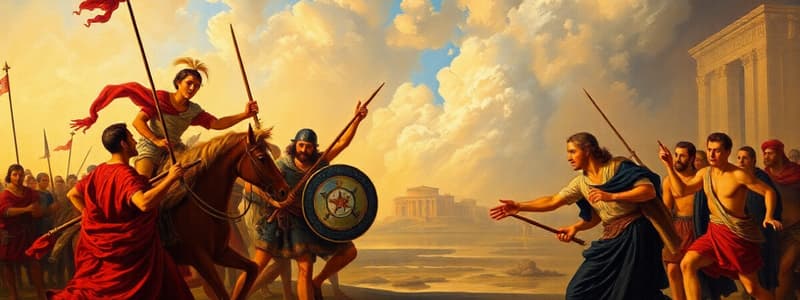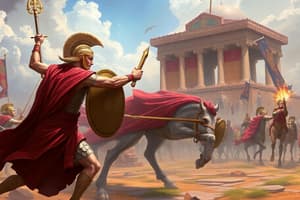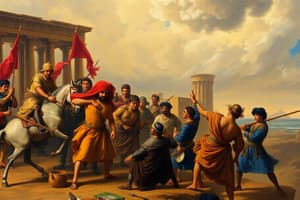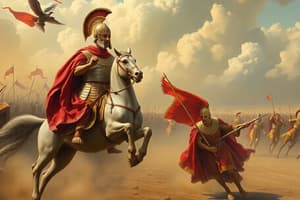Podcast
Questions and Answers
What was a key factor in the success of the Greek fleet at the Battle of Salamis?
What was a key factor in the success of the Greek fleet at the Battle of Salamis?
- Themistocles' strategic planning and maneuvering. (correct)
- The Greek forces were better trained in naval warfare.
- The Persian fleet had superior numbers.
- The weather conditions favored the Persians.
Which statement best describes the state of alliances among Greek city-states during the Persian invasion?
Which statement best describes the state of alliances among Greek city-states during the Persian invasion?
- Only Sparta and Athens formed alliances against the Persians.
- Internal conflicts often undermined their collective efforts. (correct)
- The alliances were characterized by strong political agreement.
- All city-states worked together with complete unity.
What was a consequence of the Persian defeat at the Battle of Salamis?
What was a consequence of the Persian defeat at the Battle of Salamis?
- The Persian navy gained control over the Greek coastline.
- The Greek city-states permanently joined together in a single alliance.
- It marked a turning point leading to a stronger Greek victory. (correct)
- It strengthened the Persian supply line to their land forces.
Which of the following was a challenge to the unity of the Greek forces during the Persian Wars?
Which of the following was a challenge to the unity of the Greek forces during the Persian Wars?
What role did the alliances among the Greek city-states play in the Persian invasion?
What role did the alliances among the Greek city-states play in the Persian invasion?
What was a significant factor contributing to the Greek victory at the Battle of Marathon?
What was a significant factor contributing to the Greek victory at the Battle of Marathon?
What was the main outcome of the Battle of Thermopylae despite being a Persian victory?
What was the main outcome of the Battle of Thermopylae despite being a Persian victory?
What was one notable weakness of the Persian military tactics during the wars?
What was one notable weakness of the Persian military tactics during the wars?
What cultural effect did the Persian Wars have on Greek society?
What cultural effect did the Persian Wars have on Greek society?
Which aspect of Persian military organization was considered a strength?
Which aspect of Persian military organization was considered a strength?
How did the Persian Wars influence Athenian society following the conflicts?
How did the Persian Wars influence Athenian society following the conflicts?
Which of the following strategies was commonly employed by the Persian army?
Which of the following strategies was commonly employed by the Persian army?
What role did Pheidippides play in the Battle of Marathon?
What role did Pheidippides play in the Battle of Marathon?
Flashcards
Greek City-States Alliance
Greek City-States Alliance
Greek city-states united against the Persian threat.
Battle of Salamis
Battle of Salamis
Greek navy defeated a larger Persian fleet.
Themistocles
Themistocles
Greek commander at Salamis.
Persian Defeat at Salamis
Persian Defeat at Salamis
Signup and view all the flashcards
Greek Alliance Limits
Greek Alliance Limits
Signup and view all the flashcards
Persian Wars
Persian Wars
Signup and view all the flashcards
Battle of Marathon
Battle of Marathon
Signup and view all the flashcards
Battle of Thermopylae
Battle of Thermopylae
Signup and view all the flashcards
Persian Tactics
Persian Tactics
Signup and view all the flashcards
Greek Phalanx
Greek Phalanx
Signup and view all the flashcards
Athenian Golden Age
Athenian Golden Age
Signup and view all the flashcards
Cultural Impact of Persian Wars
Cultural Impact of Persian Wars
Signup and view all the flashcards
Pheidippides
Pheidippides
Signup and view all the flashcards
Study Notes
The Persian Wars: A Summary
-
The Persian Wars were a series of conflicts between the Achaemenid Persian Empire and various Greek city-states. The period spanned from approximately 499 to 449 BCE.
-
The wars had significant impacts on Greek politics, culture, and military organization.
Battle of Marathon (490 BCE)
- A decisive Greek victory over the invading Persian forces.
- The Greeks, under Miltiades, decisively defeated the Persians, largely attributed to the Greek phalanx formation and superior leadership.
- The battle marked a crucial turning point, demonstrating the potential of Greek military organization against the Persian Empire.
- Pheidippides, a Greek runner, famously ran from Marathon to Athens to announce the victory, a legend that inspired the modern marathon.
Battle of Thermopylae (480 BCE)
- A strategically significant battle, though ultimately a Persian victory.
- The Spartan-led Greek forces, vastly outnumbered, held a narrow pass against the Persian army for several days.
- The heroic defense of the 300 Spartans became immortalized in history.
- The battle delayed the Persian advance, allowing the Greeks time to prepare for further conflicts.
- The event is a powerful example of courage and sacrifice in the face of overwhelming odds. However, the Persians eventually bypassed the pass and won.
Persian Tactics and Strategies
- The Persian army utilized a large, diverse force, including infantry, cavalry, and archers.
- They relied on overwhelming numbers and a well-organized supply chain for their large armies.
- Persian cavalry was often powerful, but less flexible and tactical than the Greek infantry.
- The Persians employed siege warfare effectively, however, they lacked the advanced naval technology that would play a critical role later in the war.
- Their strategies varied geographically depending on the terrain and resources available. A notable weakness was a tendency towards inflexible tactics at times.
Cultural Impact of the Wars
- The Persian Wars shaped Greek identity and culture dramatically, fostering a sense of shared Greco-ness despite city-state divisions.
- The conflicts highlighted a cultural contrast between the East and West.
- The Greek victory enhanced their confidence and artistic expressions, as seen in their literature, drama, and sculpture.
- The Athenian Golden Age followed the Persian Wars, a high point in Athenian political and cultural development and influence.
Greek City-states Alliance
- The Greek city-states allied against the common threat posed by the Persian invasion.
- The alliances were not always consistent, and there were periods of internal conflicts amongst Greek city-states.
- Sparta and Athens formed alliances but often had underlying disagreements.
- The formation of alliances proved pivotal for mutual defense against Persian ambitions.
- Alliances had their limits, and internal political issues and rivalries often challenged the unity of the Greek forces.
Battle of Salamis (480 BCE)
- A naval battle in the straits of Salamis.
- The Greek fleet, decisively commanded by Themistocles, outmaneuvered the larger Persian fleet.
- The Persian defeat at Salamis was a turning point in the war.
- The Persian fleet's weakened position following Salamis weakened its ability to supply their land forces in Greece.
- This marked a significant shift that eventually paved the way for a stronger Greek victory over the Persians.
Studying That Suits You
Use AI to generate personalized quizzes and flashcards to suit your learning preferences.




